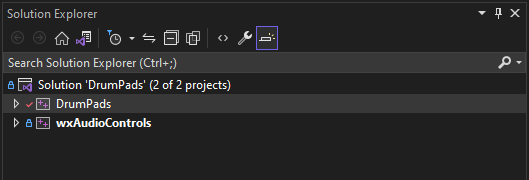While building a Visual Studio C++ project in Visual Studio 2022, I received this error while linking to a library:
Error LNK2038 mismatch detected for ‘_MSC_VER’: value ‘1800’ doesn’t match value ‘1900’ in MidiPlayer.obj MIDIPlayer E:\code\MIDIPlayer\wxmsw30ud_core.lib(dlgcmn.obj)
In case you’re not familiar with this error, Visual Studio wants to link with libraries that were built with the same version of Microsoft C (same toolset) as the code you’re compiling. In older versions of Visual Studio that meant that they had been built with the same version of Visual Studio, but now that versions aren’t as tightly-coupled to Visual Studio, it’s also possible that you can get this with libraries built with the same version of Visual Studio that you’re using.
The solution is to rebuild the library with the same MSC version as your project.
For reference, here are the different MSC, MSVC, and toolset versions:
Microsoft C 6.0: _MSC_VER == 600
Microsoft C/C++ 7.0: _MSC_VER == 700
Microsoft Visual C++ 1.0: _MSC_VER == 800
Microsoft Visual C++ 2.0: _MSC_VER == 900
Microsoft Visual C++ 4.0: _MSC_VER == 1000
Microsoft Visual C++ 4.1: _MSC_VER == 1010
Microsoft Visual C++ 4.2: _MSC_VER == 1020
Microsoft Visual C++ 5.0: _MSC_VER == 1100 (Visual Studio 97)
Microsoft Visual C++ 6.0: _MSC_VER == 1200 (Visual Studio 6.0)
Microsoft Visual C++ 7.0: _MSC_VER == 1300 (Visual Studio 2002)
Microsoft Visual C++ 7.1: _MSC_VER == 1310 (Visual Studio 2003)
Microsoft Visual C++ 8.0: _MSC_VER == 1400 (Visual Studio 2005 – v80)
Microsoft Visual C++ 9.0: _MSC_VER == 1500 (Visual Studio 2008 – v90)
Microsoft Visual C++ 10.0: _MSC_VER == 1600 (Visual Studio 2010 – v100)
Microsoft Visual C++ 11.0: _MSC_VER == 1700 (Visual Studio 2012 – v110)
Microsoft Visual C++ 12.0: _MSC_VER == 1800 (Visual Studio 2013 – v120)
Microsoft Visual C++ 14.0: _MSC_VER == 1900 (Visual Studio 2015 – v140)
Microsoft Visual C++ 14.1 – 14.16: _MSC_VER == 1910 – 1916 (Visual Studio 2017 – v141)
Microsoft Visual C++ 14.2 – 14.29: _MSC_VER == 1920 – 1929 (Visual Studio 2019 – v142)
Microsoft Visual C++ 14.3: _MSC_VER == 1930 (Visual Studio 2022 – v143)
It’s interesting that starting with Visual Studio version 2017, Microsoft started incrementing the MSC version with each “micro” build change.


